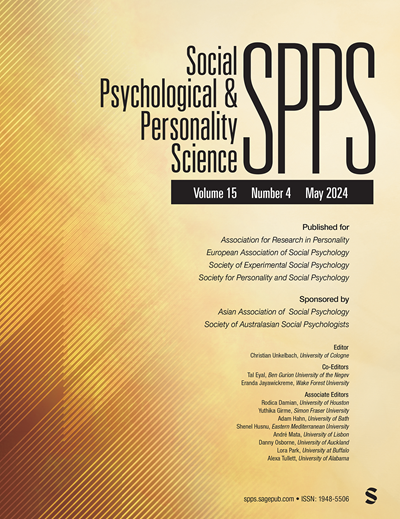The Recursive Cycle of Perceived Mindset and Psychological Distress in College
IF 3.3
2区 心理学
Q1 PSYCHOLOGY, SOCIAL
引用次数: 0
Abstract
College students are experiencing a significant mental health crisis, with rising rates of psychological distress. To help understand this trend, this study examines recursive relationships in the classroom between perceived mindset beliefs—that is, whether students perceive others in their classroom to view intelligence as malleable or fixed—and psychological distress. Across three time points, 288 undergraduates taking a physics course completed measures of perceived classroom mindset and psychological distress. Random intercept cross-lagged panel analyses, which controlled for demographic factors and students’ own mindset beliefs, revealed that perceiving the classroom culture as more fixed-minded early in the semester was associated with increased psychological distress later. Likewise, increased psychological distress early in the semester was associated with perceiving the classroom culture to be more fixed-minded later. These findings suggest that perceived mindset and distress are mutually reinforcing, highlighting the importance of addressing both in interventions aimed at alleviating student distress.大学中感知心态与心理压力的反复循环
大学生正经历着严重的心理健康危机,心理困扰率不断上升。为了帮助理解这一趋势,本研究探讨了课堂上感知心态信念(即学生认为课堂上其他人的智力是可塑的还是固定的)与心理困扰之间的递归关系。在三个时间点上,288 名选修物理课程的本科生完成了课堂心态感知和心理困扰的测量。随机截距交叉滞后面板分析(控制了人口统计因素和学生自身的思维模式信念)显示,在学期初认为课堂文化更倾向于固定思维模式与后来心理困扰的增加有关。同样,学期初心理困扰的增加也与后来认为课堂文化更具有固定思维有关。这些研究结果表明,思维定势和心理困扰是相辅相成的,强调了在旨在减轻学生心理困扰的干预措施中解决这两个问题的重要性。
本文章由计算机程序翻译,如有差异,请以英文原文为准。
求助全文
约1分钟内获得全文
求助全文
来源期刊

Social Psychological and Personality Science
PSYCHOLOGY, SOCIAL-
CiteScore
12.50
自引率
1.80%
发文量
77
期刊介绍:
Social Psychological and Personality Science (SPPS) is a distinctive journal in the fields of social and personality psychology that focuses on publishing brief empirical study reports, typically limited to 5000 words. The journal's mission is to disseminate research that significantly contributes to the advancement of social psychological and personality science. It welcomes submissions that introduce new theories, present empirical data, propose innovative methods, or offer a combination of these elements. SPPS also places a high value on replication studies, giving them serious consideration regardless of whether they confirm or challenge the original findings, with a particular emphasis on replications of studies initially published in SPPS. The journal is committed to a rapid review and publication process, ensuring that research can swiftly enter the scientific discourse and become an integral part of ongoing academic conversations.
 求助内容:
求助内容: 应助结果提醒方式:
应助结果提醒方式:


